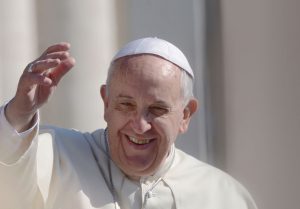
After Cardinal Jorge Mario Bergoglio from Buenos Aires, Argentina, was elected pope on 13 March 2013, and chose the name Francis, he introduced ‘go out,’ ‘periphery’ and ‘throwaway culture’ as a standard part of the papal vocabulary.
WelCom April 2018:
Cardinal John Dew
The fifth anniversary, last month, of the election of Pope Francis on 13 March 2013 has given us a time for reflection on this remarkable papacy. Pope Francis’ humble and practical ways surprised us from the day of his election. He continues to surprise, challenge and delight with his wisdom and with his knowledge of people, gleaned from his many years of pastoral experience.
When he gave his four-minute speech during the general congregation just prior to the conclave he said, ‘the Church is called to come out of herself and to go to the peripheries, not only in the geographical sense but also to go to the existential peripheries: those of the mysteries of sin, of pain, of injustice, of ignorance and of religious indifference, of thought, of all misery’. He has remained true to that statement, and like all good teachers he regularly returns to this theme, which means we have to make it front and centre in our personal lives and in the life of the Church.
Pope Francis has made some structural changes and introduced a welcome decentralisation in the Church, including moving towards a more collegial, synodal Church; but his real focus has been on changing hearts and attitudes rather than structures. I think often of all the themes he has put before us, which serve as guides for spiritual growth and Christian action:
- humility to know ourselves as sinners, and not to judge others;
- mercy and welcome for those who struggle with the Church’s teaching in their lives;
- forgiveness as an act of love and acceptance;
- the primary place of the poor and marginalised in our prayer and action;
- wars and deprivation which drive people from their homes;
- love for creation as ‘our common home’;
- the strength and the fragility of the family; and
- deep concern about violence and inequality, and the effect they have on ordinary people.
As a pastor I find Pope Francis has affected so many people, and not just Catholics. He is truly a global leader, the conscience of the world. In an interview, Helen Clark, former New Zealand Prime Minister and former Head of UN Development Programme, acknowledged how he had affected her: ‘I look, for example, around the world at who is providing a sense of inspiration and hope at the moment. It’s the Pope. I am not a Catholic but I recognise in this man tremendous goodness. A voice of sanity in a troubled world, often speaking what we all feel but could not express as eloquently.’
Regularly reading the words of Pope Francis gives me hope and encouragement, because he understands the messiness of our lives. He often speaks strongly in a very direct – and sometimes humorous – way, which challenges us to look at ourselves and how we act. He is not afraid to call out those who oppress or take advantage of others, or those who control processes that lead to great inequality or contempt for the earth. But he also speaks with great compassion and with a deep understanding and personal experience of the mercy of God. He always conveys hope. Because he is Pope I think we often see him as different in some way to ourselves, but I am sure that he does not see himself as in any way different to us.
Cardinal John’s reflection on the fifth anniversary of the election of Pope Francis was first published in NZ Catholic, 11‒24 March 2018.